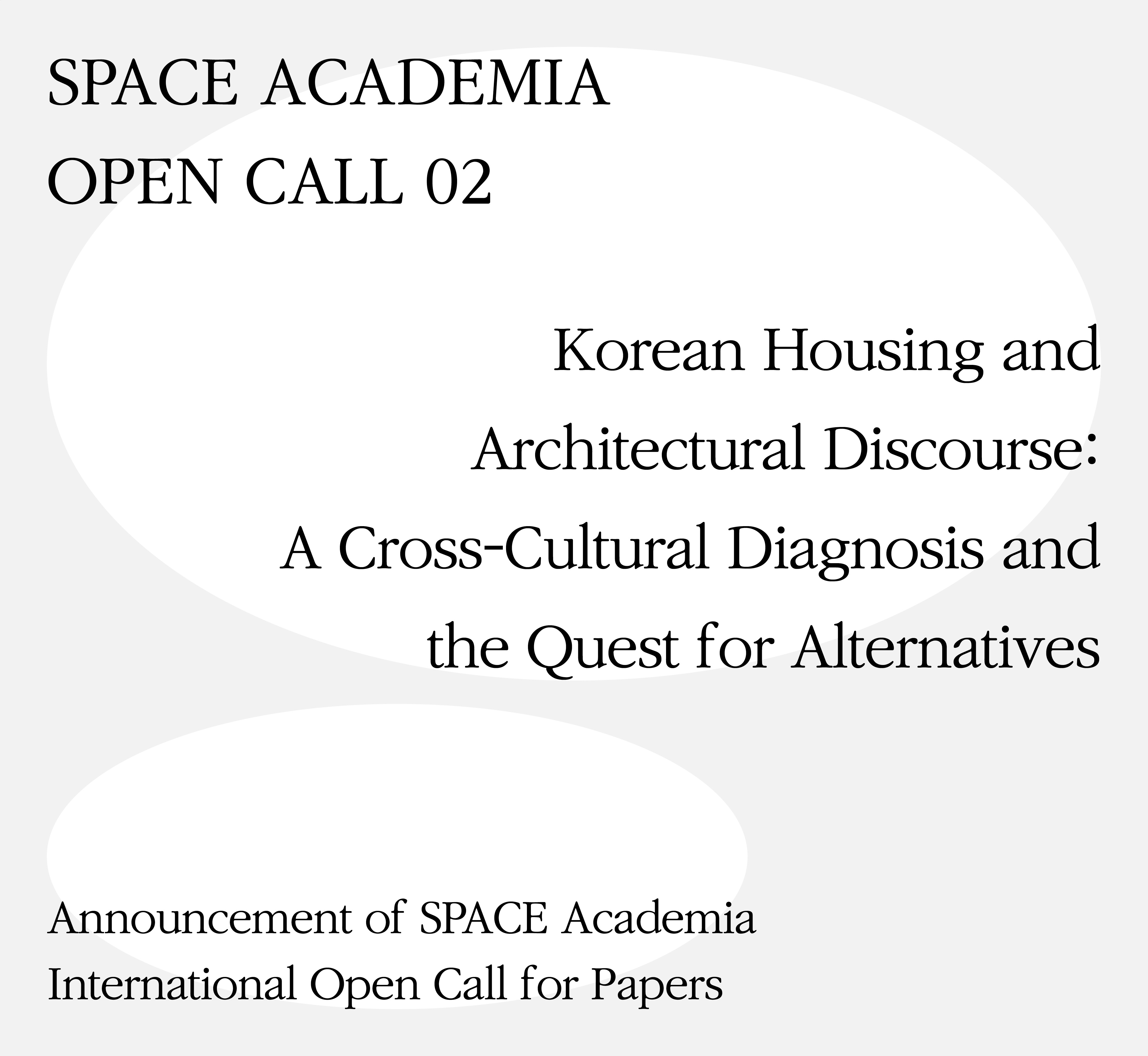
SPACE Academia International Open Call for Papers
SPACE Academia – an architectural theory research forum overseen by the monthly journal SPACE (listed on A&HCI) – opened its call for papers and proposals for special issues in February 2025. Now, SPACE Academia announces its second research theme: we invite all researchers to open up new horizons in the study of architecture and urbanism.
The theme of the second open call – proposed by Sung Hong Kim, chief editor of SPACE Academia – is ‘Korean housing’, a subject that has long been relegated to the margins of architectural discourse. For this international open call for papers, SPACE Academia invites shorter essays of approximately half the length typically required from SPACE Academia’s academic policy. Submissions must nonetheless follow a clear academic structure, including defined research questions, clear methodology and sources, sound analysis, citations, interpretations, and arguments. Papers on this theme may be submitted until February 2026, by email, and must be prepared in accordance with the Academia regulations. The Review Committee for this theme will be composed primarily of experts in housing studies.
Two of the submissions will be selected and offered the option to publish with SPACE, with submission and publication fees waived. Non-thematic submissions can be made at any time in accordance with the Academia Policy.
SPACE ACADEMIA OPEN CALL 02 - Korean Housing and Architectural Discourse: A Cross-Cultural Diagnosis and the Quest for Alternatives
- Theme: Korean Housing and Architectural Discourse: A Cross-Cultural Diagnosis and the Quest for Alternatives
- Theme Explanation
Korean Housing and Architectural Discourse: A Cross-Cultural Diagnosis and the Quest for Alternatives
Housing is the oldest and most fundamental architectural typology, occupying the largest share of urban space. Over the past six decades, which has seen rapid industrialisation and urbanisation, activities in housing development in Korea have become polarised between apartments and non-apartments (low-rise housing). As a result of the convergence of state-led laws and regulations, construction capital, and the middle class’s aspiration for homeownership, apartments have become the dominant housing typology. Apartments have emerged not merely as residential spaces, but as a key instrument for wealth accumulation and a central concern of urban and architectural policy. In contrast, medium-rise housing (so-called ‘villas’), inhabited by half of Seoul’s population, has been relatively overlooked in major government policies, planning, and support programmes.
In the 1950s, housing was among the central agendas of CIAM, giving rise to a wide range of architectural experiments. The evolution of collective housing paralleled the development of modernist architecture. And yet, within Korean architectural scholarship and practice, housing has long remained on the periphery of the discourse. Article 35 of the Constitution of the Republic of Korea stipulates that ‘The State shall endeavor to ensure that all citizens can enjoy a pleasant residential life through housing development policies and other measures’.
This call for papers seeks to make the polarised condition of Korean housing – between apartments and non-apartments – a primary focus of architectural discourse. The overarching theme may be summarised by the questions: ‘What aspects of housing reach into the domain of architectural discourse? And in what ways?’ To answer this, a precise diagnosis of ongoing phenomena must first be undertaken. This open call therefore raises the following questions and anticipates rigorous scholarly engagement with them:
1) How can the current housing phenomena in Korea be diagnosed and understood from a global urban architectural and cross-cultural perspective?
2) What role has housing played in the modern and contemporary architectural history and theory of Korea, and how have the key issues and problems in housing today been addressed?
3) Is it a meaningful exercise to explore the alternatives between large-scale apartment complexes and plot-based medium-rise housing (so-called ‘villas’)? Does a social consensus on this issue exist?
4) What can and should academia and the professional field do in order to put housing at the front and centre of architectural discourse?
(written by Sung Hong Kim)
- Eligibility: Any researcher from architecture and related fields
- Word Count: Approximately 3,000 words in English or 2,500 words in Korean
- Review Committee: To be composed of housing experts, excluding the three chief editors of SPACE Academia
- Review Duration: About 30 days after the deadline
- Selection: Two of the submissions will be selected to be published in SPACE (listed on A&HCI) and with the submission and publication fees waived.
- Submission Deadline: February 28, 2026
- Submission Method: Email (spaceacademia00@gmail.com)
- Inquiries: spaceacademia00@gmail.com
* All matters unspecified here follow the Academia Policy by default (downloadable from https://vmspace.com/eng/common/academia-guidline.html)




